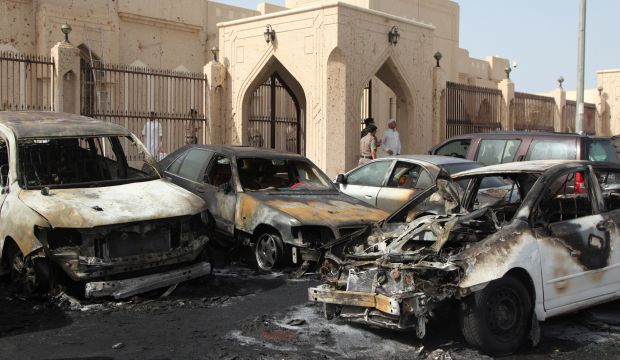After one week of targeting innocent worshippers at the Imam Ali mosque in the city of Qatif in Saudi Arabia, the Islamic State of Iraq and Syria (ISIS) carried out another attack in the Kingdom, this time on the Al-Anoud mosque in Dammam, the capital of its Eastern Province. But the difference between the two incidents is much more enormous than the 15 miles (25 kilometers) separating the two bomb sites. This time, a consensus, as overwhelming as the shock and pain felt over the loss of lives, is emerging that ISIS has failed to achieve its aim of killing as many civilians as possible. ISIS, along with its supporters and masterminds inside and outside the Kingdom, has failed to even partially achieve its aim of creating a sectarian sedition in Saudi Arabia. The group has been shocked by the confidence the Saudis have shown in the Kingdom’s ability to avert disasters no matter how terrible they are.
Ever since it was targeted by terrorists, Saudi Arabia has been at the forefront of countries warning against and countering this phenomenon. And it was among the first countries to criminalize taking part in violent activities or joining extremist and terrorist groups. Saudi Arabia realizes that fighting terrorism is no longer a domestic affair but rather an issue of concern to the entire international community. UN Secretary-General Ban Ki-moon has recently warned of the growing flow of foreign fighters into a number of hot spots. A UN committee monitoring sanctions on terrorist groups estimates that more than 25,000 foreign fighters from more than 100 countries have traveled to Syria, Iraq, Afghanistan, Yemen, and Libya. After all those revelations some still insist that no state intelligence agencies are standing behind ISIS, or that a simple person, like Abu Bakr Al-Baghdadi, is capable of building up and running such an unprecedented organized global terror network in a short period of time.
National crises are a natural reflection of the situation in surrounding countries. When ISIS settles near your northeastern borders, Houthis fight you from the south, and chaos spreads across several Arab states not too far from home, while your neighbor from across the Arabian Gulf tries to interfere in your internal affairs, and despite all that you are still one of the few major Arab countries that have escaped turmoil, a price, albeit a hefty one sometimes, must be paid. However, major Arab countries that follow wise and reasonable policies, such as Saudi Arabia, are capable of absorbing those tremors and emerging from them as powerful with the least losses.
Throughout its history, the Kingdom of Saudi Arabia has gone through several acute crises, whether domestic or regional ones. Yet the Kingdom has emerged as powerful as before no matter how severe those crises were. Every time, Saudi Arabia has managed to move steadfastly in a turbulent sea, showing an extraordinary ability to contain and keep regional chaos at bay.
